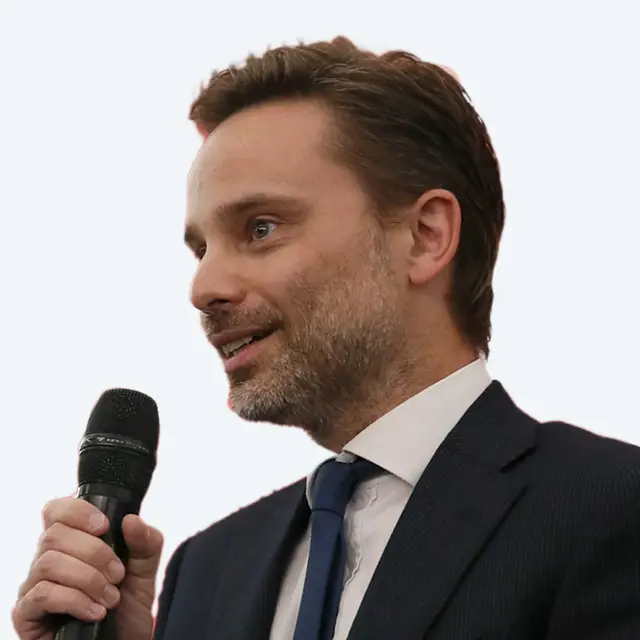.webp)










Ahmed Salem is a senior executive with over 35 years of international leadership experience across North America and the Middle East & Africa, driving large-scale energy and industrial transformation initiatives. He has led mega and complex EPC turnkey programs and operations in Power-to-X, green hydrogen, renewable energy, industrial gases, power generation, and oil & gas, with full accountability for P&L, corporate strategy execution, operational performance, and risk governance. Ahmed combines strategic business development, commercial structuring, contract negotiation, enterprise risk management, and operational excellence to deliver sustainable growth, industrial decarbonization, and long-term value creation.
.webp)
.webp)
Recognised expert in hydrogen technologies, regulation, and infrastructure. Experienced across the full engineering lifecycle - from concept evaluation to Front-End Engineering and execution. Former Managing Consultant at Guidehouse, Project Manager European Hydrogen Backbone.


15+ years experience in energy, advising C-suites in the energy and utilities sectors. Formerly Director at Guidehouse energy transition advising bp, shell, engie, enel. Expert in business development and transaction structuring. Prior to that with BNEF in carbon markets and BD. Educated at Harrow and the University of Bristol.
.webp)
.webp)
Geoff brings over three decades of global experience in the oil, gas, chemicals, and renewable energy sectors, spanning roles in research, technology, and executive leadership. He has led major innovation and infrastructure projects across seven countries, including senior positions at Shell, Petrofac, and Verditek, and now serves as EPC Director at ETFuels. Geoff’s career blends deep technical expertise in catalysis, materials, and process engineering with hands-on experience launching technology ventures and scaling renewable energy projects. A PhD chemist from Durham University and an alumnus of IMD Lausanne’s Business Leadership Program, he is widely recognised for his thought leadership in sustainable technology and energy transition strategy.
.webp)
.webp)
Dr. Houriyeh Shadmehr has 10 years’ experience in electrical engineering and power systems. She has experience in; current and future operation of the power system with Future Operations department of EirGird, very low frequency oscillation studies, power quality and harmonics, and smart grid. She has recently led many feasibility \constraint studies and cable sizing\rating studies for developers in the UK and Ireland. PhD in Electrical Engineering, Politecnico di Milano
.webp)
.webp)
Ishfaq is a former Senior Business Development Manager at BYJU's, India's leading Edtech firm. He holds a BEng and MSc in Control System Engineering.
.webp)
.webp)
Principal Control Systems Engineer with a track record delivering control and automation architectures for hydrogen, renewable energy, and large-scale industrial process facilities. Previously led cross-disciplinary controls programs at large system integration firms, supporting municipal utilities, cavern storage, upper/mid-stream Oil and Gas projects, and hydrogen liquefaction. Experience spans DCS/PLC system design, instrumentation, network and cybersecurity architecture, and commissioning of continuous process and safety systems. Focused on enabling reliable, scalable, and integrated controls for next-generation fuels production.
.webp)
.webp)
2 decades experience developing large infrastructure projects, commodities and sustainability as a banker, private equity investor, project developer and CFO at companies including Goldman Sachs, Climate Change Capital, Rio Tinto and Google. Has lived and worked in every continent other than Antarctica. Former CFO of Rio Tinto’s Commercial & Shipping Group, Google UK CFO, Google UK Sustainability Lead and Retail Director. Harvard MBA and BA.
.webp)
.webp)
Former Director of Development at RWE Clean Energy. 16 years’ experience developing utility-scale renewable energy projects in the US. Led multidisciplinary teams to advance and de-risk pipeline of early, mid and late-stage development assets. Oversaw market evaluation, site identification, land acquisition, easements, interconnection, environmental studies for over 2 GW. Responsible for engineering procurement and construction contracts for new build wind, solar and battery storage.
.webp)
.webp)
Director, Engineering. Chartered Engineer with 30 years experience managing projects across power generation, infrastructure, and new technology from concept through to installation and then operation. Neil has deep expertise in process engineering, procurement, construction, and safety. He is a named inventor on multiple patents for emission control technology and thermal treatment of biomass and has experience working for companies including Gazprom, BP, ArcelorMittal, and Climate Change Capital. Neil has been Chief Engineer for numerous technology businesses and Private Equity Firms including Peak Carbon, Clean Energy Generation, Perpetual Next, and Climate Change Capital.
.webp)
.webp)
Former Chairman and CEO of E.ON Climate & Renewables’ US business. 27 years experience developing utility-scale renewable projects. Known as a pioneer in the Texas wind market, Woodson is the former CEO of E. ON Climate & Renewables in the U.S. where they invested more than $7 billion and built over 4 GW of renewables projects in 14 states. Woodson has a deep public policy background and is a former board member of the American Wind Energy Association, the American Council on Renewable Energy, and a past president of the Wind Coalition.
.webp)
.webp)
Former VP Major Capital Projects at BP. 40 years experience in initiating, leading, and delivering multi-billion $, complex energy and infrastructure projects in global locations with diverse technical, commercial, fiscal, social, and regulatory environments. In his last 7 years at BP, as VP Projects, Russell led the Global Concept Development organisation, with responsibility for portfolio screening, concept development and business case decision-making for all BP’s Energy Projects globally, up to Final Investment Decision.
.webp)
.webp)
Process engineer with two decades experience in the development and execution of chemical industry projects at GlaxoSmithKline, Johnson Matthey, Jacobs (Worley), KBR and supporting Copenhagen Infrastructure Partners. At Johnson Matthey, he led the commercialization of the new sustainable technologies portfolio as Business Development Director. This portfolio included sustainable methanol, ammonia cracking, synthetic natural gas, and battery cathode materials recycling.


30-year commodities trading veteran:Senior executive with former leadership roles at Morgan Stanley, Bank of America Merrill Lynch, Natixis, EDF Trading and VTB across global energy markets. Aviation & shipping fuel specialist:Extensive experience structuring jet fuel, marine fuel and energy hedging solutions for airlines, shipping companies and end-users, including long-dated offtake and prepay structures. Global platform builder: As CEO of VTB Trading and Global Head of Commodities, built a fully integrated global trading and financing platform operating across regions. Energy markets pioneer: Founding contributor to Intercontinental Exchange, the first digital commodities trading platform; creator of the first oil options trading desk at TotalEnergies; and founder of Alternative Energy—the first dedicated energy derivatives trading company in Europe, backed by Air France, CMA CGMand Crédit Agricole
.webp)
.webp)
Former Chief of Staff and Head of Strategy at bp where he worked for 36 years. Founding CEO of OGCI Climate Investments, a USD 1bn investment fund set up by the world's largest oil and gas companies. Has held Board positions with the Extractive Industries Transparency Initiative and a number of energy ventures. Currently an advisor on the energy transition and is a Distinguished Fellow with the World Economic Forum's Future of Mobility Platform.


CEO of international football club and ex-portfolio manager at Elliott Advisors. Extensive investment experience in investing in and financing large infrastructure investments and alternative asset classes. Prior experience at global alternative asset managers Silver Point Capital and Apollo. BA in Economics and Finance from Bocconi University, MBA from Harvard Business School.
.webp)
.webp)
Private investor focusing on investments in decarbonization and energy transition. Former Managing Director and Partner at Warburg Pincus, overseeing private equity investments across the energy value chain, including energy transition, services & technology, oil & gas (upstream, midstream, downstream), and power (conventional, renewables). Undergraduate degree from the Norwegian School of Economics and MBA from Harvard Business School.
.webp)
.webp)
Fourth-generation seafarer and master mariner with over 30 years of experience in the shipping industry around the world, with 11 years at sea. Significant hands on and management experience in the commercials and operations of many asset classes from bulk carriers, product and crude tankers through to LNG carriers at companies including Temasek, Rio Tinto, Reliance, Citi, Vitol and BP. Expert advisor to shipping companies on how to manage the GHG transition efficiently.


